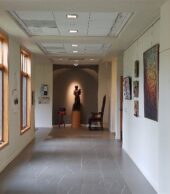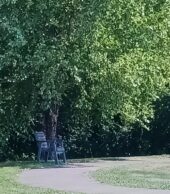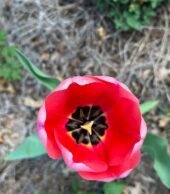Eily Marlow serves as the Program Associate for Vocation and Reflection in the Center for Civic Engagement at Macalester College. Along with Kiely Todd Roska, Eily is facilitating the upcoming event “Being Real: Practicing Authenticity, Courage, and Humility in Everyday Life” (Thurs., Nov. 9, 9a-3p). Learn more and register online.
Being Real
Questions that Move Us Toward Our Best Selves
My spouse asked last night, “Am I great at my job or just a worker among workers?”
“Both,” I answered.
It is difficult to ask ourselves such questions. We dare to share them only with our intimates, fearing we might betray too much pride or insecurity in the asking. It is also hard to speak aloud such questions because we do not yet know what we don’t know about ourselves. We need others to help us see our blind spots and find our courage, lest both our character defects and most brilliant attributes remain hidden. In the recovery community this process of asking how good we actually are is called, “right sizing oneself,” being reminded that we are never as amazing or as terrible as we imagine ourselves to be.
Wonderfully Made . . . to Work Together
Thankfully there is one unquestionable truth about who we are and how we move through the world that we are all “fearfully and wonderfully made.” We have each been endowed with particular gifts. We each deserve clarity about those gifts and how we name those gifts for ourselves and with others. On the other hand, we are also self-made. We have been given the capacity for self-determination and growth. When our sense of giftedness and our desire for growth seem in tension, we can wonder whether our efforts are too much or not enough. For example, I have been in a job that I love for 12 years. From time to time, however, I go through periods when I wonder if I should be more ambitious or accept a larger challenge. In low moments I even fret whether I am unable to do anything else. “Am I doing enough?,” the quickly drifts toward “Am I enough?”
What if our society celebrated being an authentic “worker among workers,” as much as it did standing out? A poem by Marge Percy called “To Be of Use” suggests to me the dignity and satisfaction of bringing our authentic selves to our work with others:
I want to be with people who submerge
in the task, who go into the fields to harvest
and work in a row and pass the bags along,
who are not parlor generals and field deserters
but move in a common rhythm
when the food must come in or the fire be put out.
Making their authentic contributions to fulfill a greater goal, people working together have built the church, our infrastructures, and made our technological and medical advances. What would it look like if we could actually celebrate our communities’ shared harvest, rather than worrying so much about individual selves? Could we throw away the measuring sticks and competitions (whether real or imagined) about who does what and how much? Could we instead allow ourselves to be subsumed into the larger mission or the simple task at hand? Instead of producing insecurity, questions like these offer direction about where we need to step up and where we should step back in our work in order to live in a way that is real.
Where Have We Missed the Mark?
This sounds compelling, but how do we get there? I suggest we return to the wisdom of the recovery community and find some tools for continuing to hone ourselves toward the most authentic person we can be in each situation. The recovery community recommends personal reflective practices (alone or with someone we trust) to regularly get a reality check on our own self impression. Much like the ancient Christian practice of Examen, these personal inventories most often happen at night to review the day.
Interestingly, the process of daily inventory (Step 10) comes only after the instruction to do a complete moral inventory of one’s life and discover where we have missed the mark in life (Step 4). Meticulously combing the entirety of one’s life for our flaws might seem painstaking, but the process reveals patterns of unwanted behaviors and opportunities to change. Occasional missteps are not the problem; the problem lies with whatever ways of being and thinking get in the way of our best self.
What Gets in the Way of Our Best Selves?
With this broader self-knowledge in place it becomes easier to do these nightly “spot checks” on our lives that appear in Step 10. The recovery tradition suggests examining where we have fallen short in our day, tracking, for example, when we felt resentment or reacted out of fear. Tracking fears and resentments are certainly important, but what if we also asked ourselves when we notice ourselves living out of our values, when we put in 100% effort, or overcame an obstacle? Adding to our inventory those places where we were living out of our best selves cultivates a more holistic account of the day,
When you can articulate what you are striving to be in this world and identify your particular barriers to getting there, you will know best what nightly questions you need to be asking. Let me suggest a few:
- What moments throughout the day were the purest version of you?
- When were you the most kind, powerful, engaged (whatever YOU are striving for)?
- Where in the day did God wink and smile at your actions?
- Where were you not your best-self during the day and why?
- Where there regrets, and if so can anything be done to right them?
- Where was more humility needed?
Staying at the Process
If attended to faithfully, a nightly inventory allows us to see that our internal struggles and life challenges are not just a ball and chain. Our struggles are also an opportunity to continue to co-create with God, to chisel out from our inherent beauty those aspects of ourselves that do not always shine forth. We are each, in fact, a “worker among workers,” and persons worthy of questions that help us settle into giftedness and stay at the process of becoming even more real.

Explore the possibilities for personal retreat.
Learn more about Benedictine spirituality.






